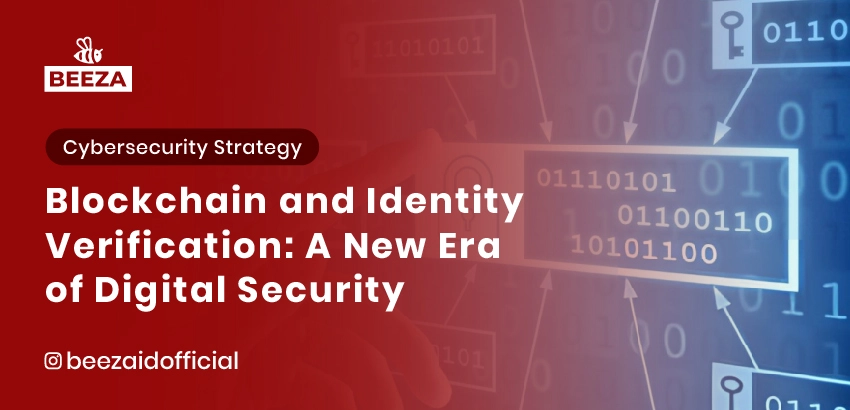
In today’s digital era, where data is one of the most valuable assets, ensuring the security of personal information and identity is a significant challenge. Organizations face growing threats such as data breaches, identity fraud, and privacy violations that can harm individuals and businesses alike. To address these challenges, blockchain technology has emerged as a revolutionary solution, offering enhanced security, transparency, and efficiency in identity verification processes.
Initially known as the technology behind cryptocurrencies like Bitcoin, blockchain is now being applied across various sectors, including digital identity. This article explores how blockchain supports identity verification, its benefits for individuals and businesses, the challenges it faces, and the solutions to maximize its potential.
What Is Blockchain in the Context of Identity Verification?
Blockchain is a distributed ledger technology that records transactions permanently and immutably across a network. In identity verification, blockchain enables decentralized data storage, ensuring that information cannot be tampered with or accessed by unauthorized parties.
This technology empowers individuals with full control over their data, reducing reliance on third parties such as government agencies or major tech companies. Additionally, blockchain facilitates faster and more secure identity verification through advanced cryptography.
Benefits of Blockchain in Identity Verification
Blockchain brings several significant benefits to identity verification for both individuals and organizations:
- Enhanced Data Security
Blockchain uses advanced encryption methods to protect data. Any data changes are recorded in a new block verified by the network, making unauthorized alterations nearly impossible. - Transparency and Accountability
Every transaction or data change is permanently recorded in the network, increasing trust through verifiable data. - Reduction in Identity Fraud
Blockchain’s transparent recording of identity-related activities makes data forgery almost impossible. - Operational Efficiency
Identity verification processes, often time-consuming, can be expedited with blockchain, reducing costs and improving customer experiences. - Decentralized Data Storage
Data is not stored in a central location, minimizing the risk of large-scale cyberattacks. - User Data Control
Users have complete control over who can access their data, ensuring privacy and compliance with regulations.
Applications of Blockchain in Identity Verification
Blockchain technology can be applied in various aspects of identity verification, such as:
- KYC (Know Your Customer)
Traditional KYC processes, often slow and expensive, can be simplified with blockchain. Verified identity data can be reused across institutions without the need for repeated verifications. - Digital Identity Storage
Blockchain allows individuals to store personal information securely in a digital identity wallet, such as biometric data, passports, or educational certificates. - Biometric Authentication
Blockchain can integrate with biometric technology to enhance authentication security, such as fingerprints, facial recognition, or iris scans. - Identity Verification in E-Commerce
Blockchain ensures the authenticity of buyers and sellers in online transactions, reducing fraud risks. - Data Access Management
Organizations can manage data access permissions through blockchain, ensuring sensitive information is only available to authorized parties.
Challenges in Implementing Blockchain for Identity Verification
Despite its promise, adopting blockchain for identity verification faces several challenges:
- Lack of Technology Understanding
Many individuals and organizations are yet to fully grasp blockchain’s workings and potential to enhance data security. - Immature Regulations
Some countries lack clear regulations for blockchain use, especially in digital identity contexts. - Implementation Costs
The initial infrastructure for adopting blockchain requires significant investment. - Scalability Issues
Blockchain often struggles to handle large data volumes at high speeds. - Privacy and Legal Compliance
Blockchain must adhere to data privacy regulations, such as GDPR or Indonesia’s Personal Data Protection Law (UU PDP).
Case Study: Blockchain in Financial Industry Identity Verification
A leading fintech company in Asia faced challenges with a slow, costly KYC process and high risks of data errors. After implementing blockchain technology, the company developed an integrated, automated KYC system.
Problem
Manual KYC processes took up to two weeks, with high operational costs.
Solution
Using blockchain to store and verify customer identity data in real time.
Results
KYC processes were completed in under 24 hours, reducing operational costs by 50% and significantly improving customer satisfaction.
Key Points
- Blockchain offers advanced data security through encryption.
- It enables transparency and efficiency in identity verification processes.
- Applications include KYC, digital identity storage, and biometric authentication.
- Challenges include regulatory uncertainty, scalability, and implementation costs.
- Innovative solutions, like those provided by Beeza, can help businesses maximize blockchain’s potential.
Conclusion
Blockchain is ushering in a new era of security and efficiency in identity verification. It offers revolutionary solutions to address issues like identity fraud, data breaches, and information insecurity.
However, successful blockchain adoption requires a deep understanding, supportive regulations, and collaboration with reliable technology partners. Beeza.id, with its innovative solutions and expertise, is ready to help your organization adopt blockchain for better identity verification.